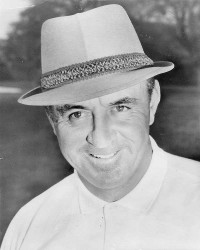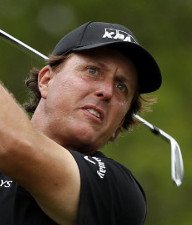 Major Breakthrough: When will the first 50 year old win a major?
Major Breakthrough: When will the first 50 year old win a major?
If you go back and study the winners of golf’s four major championships (The Masters, the U.S. Open, the Open Championship and the PGA Championship) since 1960, some interesting facts present themselves.
Golfers between 26 and 30 years of age have won almost 40% of golf’s biggest titles. The next most successful age group was players 31 to 35 years of age. In total, 75% of major championships were won by players 35 years old or younger.
When you examine players 40 years of age and older, the numbers fall off quickly. Less than 10% of these championships have been won by this age group. No player 50 years or older has ever won a traditional major championship. Of course, there are “senior” majors for players on the Champions Tour, which only allows players 50 years and older to play, but this article focuses on the U.S. Masters, the U.S. Open, the Open Championship and the PGA Championship.
The golf world’s fascination with older players contending for majors is not a new phenomenon. 53-year old Greg Norman led after three rounds at the 2007 Open Championship before erratic driving derailed him in the final round. Two years later at Turnberry, Tom Watson took the tournament lead to the 72nd hole where he made bogey and then lost a 4-hole playoff to Stewart Cink. If Watson had made par that afternoon, he would have won a major championship at age 59, some 26 years after his last win at age 33.
Somehow, despite the runs that Norman, Watson and a few others including Fred Couples have made, the oldest player to win a major championship is Julius Boros who was 48 years old when he won the 1968 PGA Championship.

If you go back further, before 1960, there are some interesting names that show up on the list of players who won majors after they turned 40 years old. Ben Hogan captured the Masters, the U.S. Open and the Open Championship as a 40 year old in 1953.
As far as being competitive in major championships after turning 50, the crown would have to go to Sam Snead. Snead won a Masters title after his 40th birthday. In 1974, after a final round 68, Snead finished just three-shots out of the lead at the PGA Championship. He was 61-years old. Earlier that season, Snead made the cut at the U.S. Open as a 61-year old, a record that still stands today. Snead totaled 9 top-ten finishes at major championships after his 50th birthday.
Most people agree, the championship most likely to yield its crown to a 50-something is the Open Championship. Hard, dry fairways place less of a premium on distance. Mark O’Meara, commenting on Watson’s near miss in 2009 explained, “the other major championships, it’s all about carry and power. Links golf is about conditions, wind, and playing a variety of different types of shots.”
So, if there isn’t a major champion in our current stable of players in their 50’s, what group of players in their mid to late 40’s have the potential to break Boros’ record? Three American names jump out at us immediately.
Jim Furyk is sidelined by an injury right now, but in the past five seasons he has four top-five finishes at the majors. Furyk will turn 46 this May. Steve Stricker will turn 49 later this month. He has five top-15 major finishes in the past five seasons. Phil Mickelson will turn 46 at this year’s U.S. Open. He won the Open Championship in 2013 as a 43-year old, and his runner-up finish at this year’s AT&T Pebble Beach Pro-Am, proving that there is still some gas left in the tank.
Aging Tour pros are still chasing Julius Boros and racing the calendar. Someday, one of them, drawing inspiration from Watson and Snead, will break through. It’s just a matter of time.
Update:
The first 50 year old to win a major in golf was Phil Mickelson. He won the 2021 PGA Championship at the age of 50 years, 11 months, and 7 days. This broke the previous record held by Julius Boros, who won the 1968 PGA Championship at the age of 48 years, 4 months, and 18 days.
Mickelson's victory was a major upset, as he had not won a major since 2013 and had not won a PGA Tour event since 2019. However, he played some of the best golf of his career at Kiawah Island, shooting a 62 in the second round and a 67 in the final round. He finished the tournament at 20-under-par, two strokes ahead of Brooks Koepka and Louis Oosthuizen. 
Mickelson's victory was a historic moment in golf, and it showed that age is no barrier to success in the sport. He is now the oldest player to win a major in the history of the game, and he is an inspiration to golfers of all ages.
More details about Phil Mickelson's win at the 2021 PGA Championship:
- He entered the tournament as the 11th seed, and he was not considered one of the favorites to win.
- He started the tournament with a solid 69 in the first round, but he really caught fire in the second round. He shot a 62, which was the lowest round of the tournament at that point.
- He maintained his momentum in the third round, shooting a 67. He entered the final round with a two-shot lead over Brooks Koepka and Louis Oosthuizen.
- Mickelson made some mistakes in the final round, but he also made some clutch putts. He bogeyed the 15th hole, but he birdied the 16th and 17th holes to take a two-shot lead. He then made par on the 18th hole to secure the victory.
- Mickelson's win was a major upset, but it was also a historic moment in golf. He is now the oldest player to win a major in the history of the game.
Mickelson's victory was also a personal triumph. He had been struggling with his game for several years, and he had not won a major since 2013. His win at the 2021 PGA Championship showed that he still had the game to compete at the highest level.





